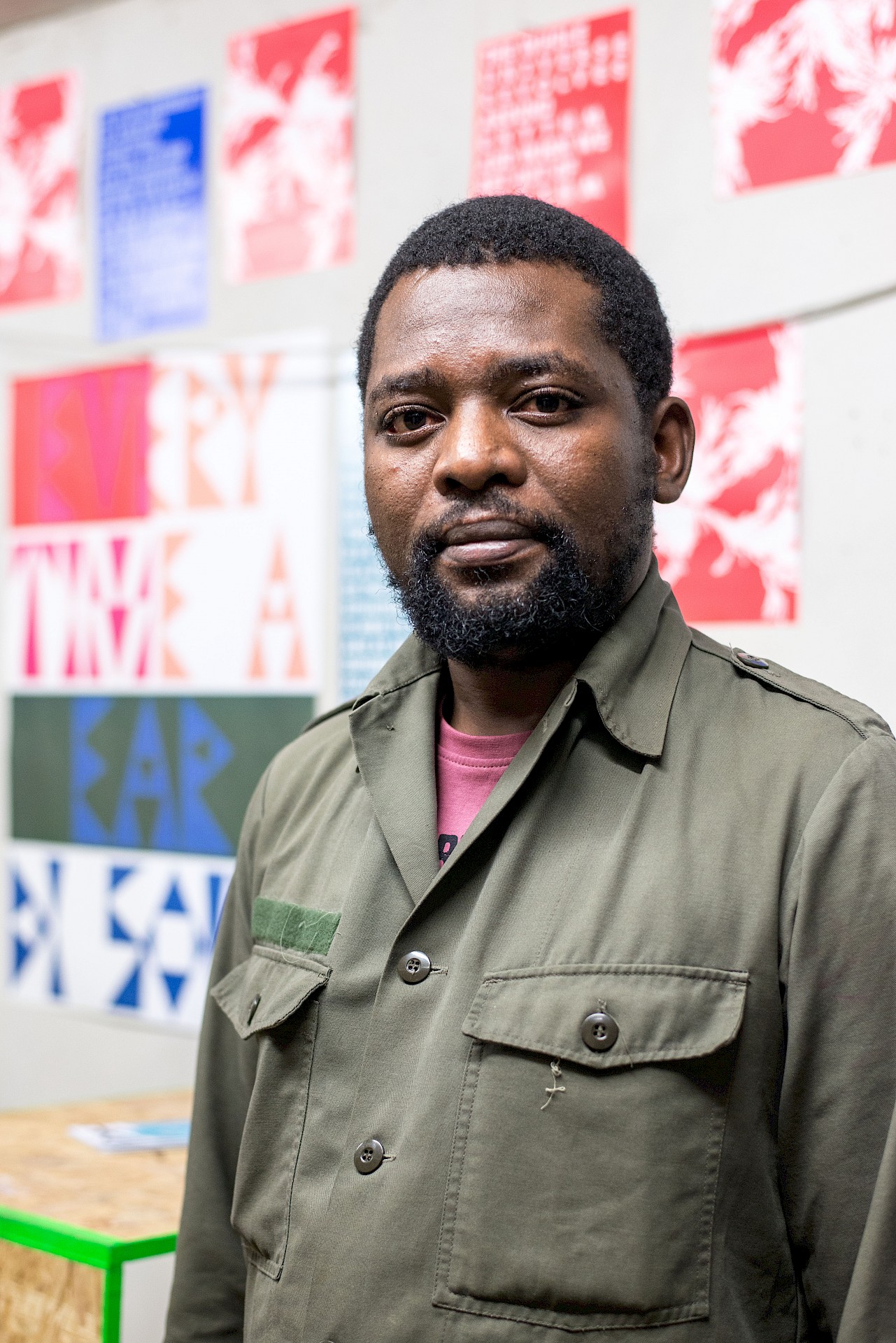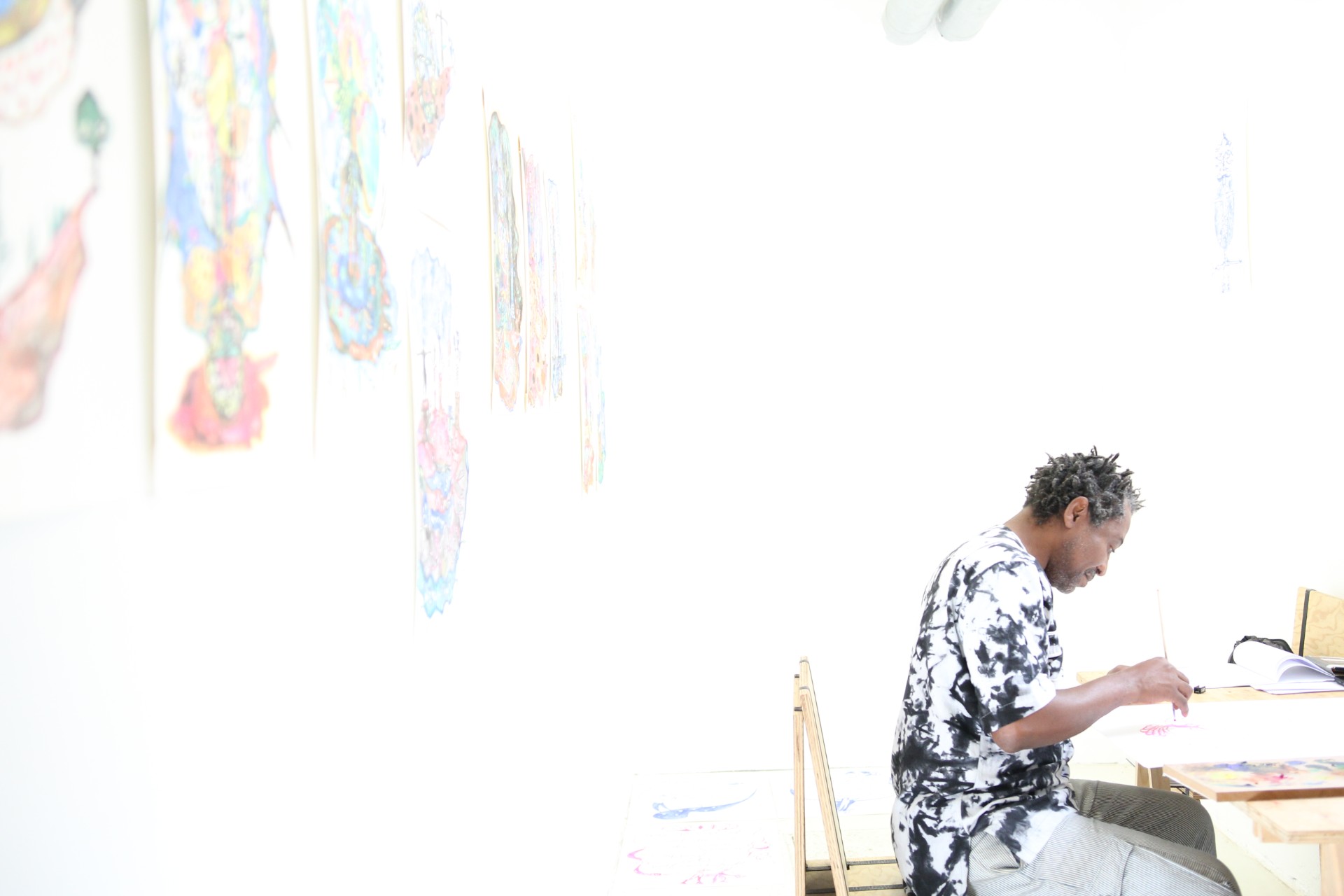Artist in Residency 2018
With Nkosilathi Emmanuel Moyo
Residency 01.01.–31.03.2018
In Collaboration with Artists at Risk (AR) Safe Haven Berlin
Presentation 29.03.2018 19:00
With a launch of Nkosilathi Emmanuel Moyo's book 'Dismantling the System of Mugabeism' which he finished during his residency, followed by a talk between the author and Marita Muukkonen and Ivor Stodolsky (Artists at Risk)
Nkosilathi Emmanuel Moyo is a human rights defender, democracy activist, writer, poet and protest musician hailing from a small mining town named Kwekwe at the center of the Republic of Zimbabwe. He is also the co-founder and director of Z.O.Y.P., the Zimbabwean Organization for Youth in Politics. In his writings, as well as in his music, he addresses the government oppression and dictatorship in Zimbabwe which has led to the regime targeting him and putting him under state surveillance. After receiving death threats, Artist At Risk took on the case to welcome Nkosilathi as the first resident of AR-Safe Haven Berlin, co-hosted by SAVVY Contemporary. During is stay, he is finishing his new book, an attempt at ‘Dismantling the System of Mugabeism’ while taking time to recover before returning home to Kwekwe to continue his activism.
ARTISTS at RISK (AR) is a new institution at the intersection of human rights and the arts. AR is dedicated to mapping the field of persecuted visual art practitioners, facilitating their safe passage from their countries of origin, hosting them at “AR-Safe Haven Residencies” and curating related projects, including the “AR Pavilion”. Artists, writers, curators, critics and scholars are targets of politically motivated threats and persecution in great parts of the world. Perpetuum Mobile (PM) initiated Artists at Risk (AR) as a platform and network which currently comprises 7 operational residencies. AR develops cooperation-programmes with artist-in-residency centres, art/film/theatre unions, cities and human-rights networks. Perpetuum Mobile (PM) furthermore curates events, conferences and the dedicated “AR Pavilion” — recently at the Athens Biennale; parallel to the Istanbul Biennial; at Matadero-Madrid — which showcases the artistic practices of Artists-at-Risk (AR) Residents.
Nkosilathi Emmanuel Moyo's residency at Artists-at-Risk (AR) Safe Haven Berlin is curated by Perpetuum Mobile (PM) and hosted in co-operation with SAVVY Contemporary. It is co-funded by Perpetuum Mobile with a grant, together with European Alternatives, from the Creative Europe Programme of the European Union.
Interview
Nkosie spoke with SAVVY’s Jörg-Peter Schulze about his practise and ideas. The interview took place during a walk on a cold but friendly winter day in Feburary at Volkspark Humboldthain in Berlin.

First of all, welcome to SAVVY Contemporary and thank you for giving us the opportunity to have this conversation with you. I'd like to start with an observation that made me curious: you usually attach a WhatsApp contact to the videos you upload to YouTube or sometimes one finds it at the end of articles by and about you. I’m curious, can you talk a bit about what came out of this practice? Is there something especially memorable?
Thank you very much!
Putting my WhatsApp number on my articles or on my songs has helped me to get direct feedback from thousands of people in my country who are interested in my work. The feedback helped me to improve in my work as people directly raise their concerns pointing out the grey areas which they might notice and where I must improve so this actually is a practise which has helped me to get more of free consultancy and constructive feedback from the people of Zimbabwe who follow my work.
How do you see the role of WhatsApp in terms of being a safe space for exchange – is it even safe? Maybe censorship doesn’t take place there but everyone can access these semi- or sub-public spaces and denounce its members. In Germany this development just began, I guess in Zimbabwe it is already full on with groups that have 10.000+ members. Or is that number too high? How much can an oppressive system be undermined this way?
WhatsApp is becoming the most efficient tool or method of communication in my country. Anything which interests the people spreads like veld fire once shared on WhatsApp and within minutes it will be viral. Most of my poems and music are viral on WhatsApp and other social media platforms and this helped to spread my message to the people of Zimbabwe. In terms of safety no communication method is 100% safe but WhatsApp is encrypted and safer than calling which can be bugged or intercepted. The oppressive regime in Zimbabwe censors almost everything in the media but with the coming in of WhatsApp they have failed to exercise their censorship tactics on it except creating a cyber security law which they are now using to try and intimidate people that you can get arrested if you send something ‘subversive’. However WhatsApp is still the quickest way we are using as young people to interact and share information.
It’s also important for your music and books to circulate. Let’s talk about your work. How do you personally try to undermine the system? What is it that you want to achieve?
I use arts particularly poetry, protest music and I write non-fiction books to challenge the political status quo in Zimbabwe. We have a government which has been oppressing the people for almost four decades, political corruption and kleptocracy is also high in my country. So my activism, using arts as a tool, is the little contribution I can make towards advocating for democracy, human rights and respect of the rule of law in Zimbabwe. What is that I want to achieve? I want the tyranny in Harare to know that they can’t just oppress the people and get away with it. My protest art will play a watch dog role and demand justice. Some of my works are Pisarema raNkosilathi, a protest musical album, Zimbabwe A Revolution Waiting To Happen and Robert Mugabe From Freedom Fighter To The People’s Enemy.
What role does art play in your activism? How’s that connected for you?
Art is an important tool to convey my message to the people of Zimbabwe, it is an effective tool in movement building and conscientizing the masses. Protest music and poetry provides edutainment which brings people together for a common cause and it has proved to be a powerful way of raising political awareness in my country as people continue to interact and debate about the issues which I raise through my arts.
You are a big fan of reggae music and it’s obvious that it has a big influence on your work. It’s really music that has a lot of message, especially the conscious type that you do. Did you chose the genre or did the genre chose you?
You really made me laugh here. A little bit of both! Reggae is in me and I am in reggae I grew up loving reggae music. It is a genre which was used by pioneers of protest music the likes of Peter Tosh and Bob Marley who used music to challenge the social injustice of that time so this is what I grew up listening to and it could appease the revolutionary spirit in me. So in my protest music I use reggae and most of my songs also went viral on social media.
And how does a residency program as here in Berlin with SAVVY or going to Europe feed into that?
I am here on a three months residency with Artist At Risk which also partners with SAVVY. It was an honour to be given that residency so that I can breathe in fresh air as you know my arts touches the political nerves in my country leaving me being targeted by politicians who feel threatened by work as a result some even target my life. So am here to take a break from all those hustles and threats against my life whilst re-strategizing and rethinking new interventions that I can take to continue with my artivism when I return back home in April. I sincerely appreciate the work being done by Artist At Risk and AVVY in terms of supporting various artists from different countries. They must keep up the good work they are doing.
At the end of your stay here, you’ll launch your new book, can you tell us something about it. Your last book was about Mugabe. Now that he's gone, his system is still in place. Still a lot work to do. What’s next?
I am launching a book titled Dismantling the System of Mugabeism. In this book am arguing that yes Mugabe the person is gone but the system of dictatorship which he left behind is still intact. So for Zimbabwe to be totally democratized there is a critical need to dismantle the system of Mugabeism and put in place new political structures. The ‘new’ political dispensation in Zimbabwe is just the continuation of the same old story of a ZANU-PF tyranny only Mugabe is missing in the picture but the people who are in Zimbabwe’s government today are the same people who destroyed Zimbabwe alongside Mugabe so we are on the same bus what changed is the driver. For meaningful change to happen Zimbabweans must stand up and dismantle Mugabe the system, the culture and the institution which is very allergic to democracy.
What’s your ambition? I think it’s closely related to your home community in Kwekwe?
All I desire to see is a democratic state where the rights of our people will be respected and all our freedoms stipulated in our constitution being given to us.
We didn’t really talk about poetry –maybe you can let one poem speak for itself? Would you share one with us?
Freedom.
They say a lot about you like a mermaid
But who has ever seen you
You are written all over the books like verses of the bible
But how many obey your rules
Millions are spent every year celebrating something which looks like you
But your presence has never been felt
Where are you Freedom, do you exist?
When I was born my mum told me I am free
Stories of colonisation and slavery were our daily bread
Politicians at Munhumutapa building claim they liberated us
But oppression flows all over the country like Zambezi river
Flooding all our democratic rights
My life is endangered like a rhinoceros
Because of my love for you Freedom
Where are you Freedom, do you exist?
I am yearning for you.
I HAVE to ask! Do you still give out your WhatsApp?
Yes, I do that since it’s the only way to keep me in touch with my audience. My number is +32485850059.


